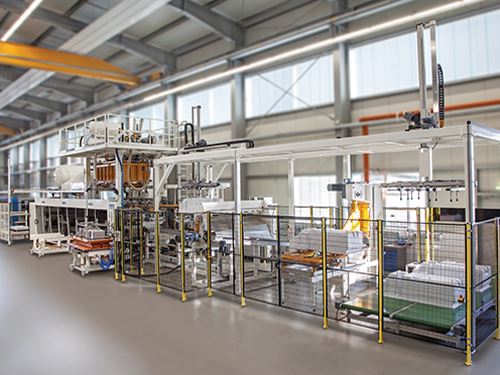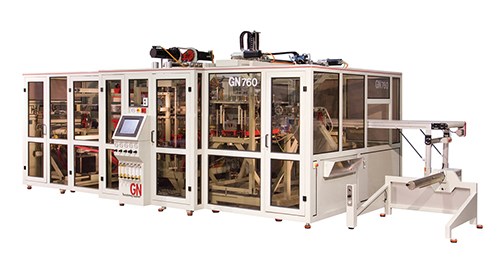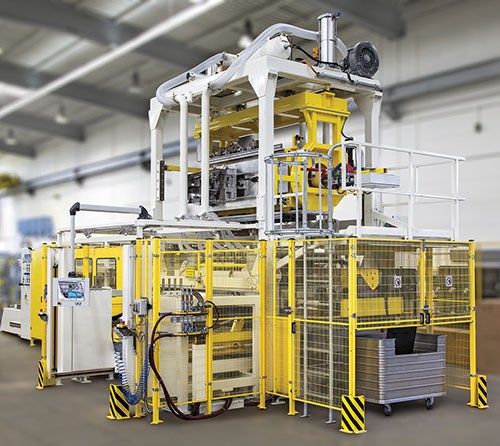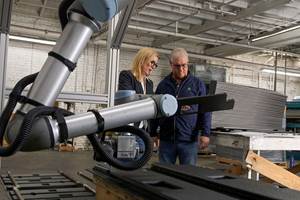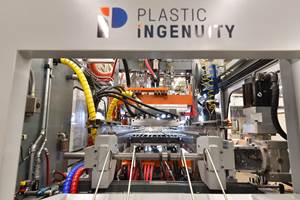K 2013 Preview: Thermoforming
Speed, versatility, control, and cost savings are keys to new thermoforming machines for packaging and industrial applications
Speed, versatility, control, and cost savings are keys to new thermoforming machines for packaging and industrial applications that will debut next month at K 2013.
FASTER CYCLES, MORE CONTROL
Germany’s Kiefel (U.S. office in Portsmouth, N.H.) will show two forming machines that are said to significantly increase productivity because of a new stacking station. The new stacking system, dubbed “Best,” stacks cups vertically, facilitating subsequent sleeving and packaging steps, Kiefel says. At the show, the firm will be producing PP cups with the new stacking station and the KTR 5 “Speed” thermoformer. Kiefel says this combination permits PP cups to run at cycles comparable to PET.
The new stacking system will also be shown with Kiefel’s KMD 78 “Speed” pressure former, making PP trays in a 16-up tool. Kiefel states that both packaging machines can run PET, PP, and bioplastics such as PLA.
Illig of Heilbronn, Germany, will show automatic roll-fed machines equipped with its Intelligent Control Concept (IC) for improved process stability and product quality. The new control technology includes modules for optimizing all aspects of the process, from simplification of machine operation and quicker tool changes to enhanced process control. IC is designed for new-generation formers with all-electric servo drives.
Illig’s ThermoLineControl module can be used by operators to call up and program all components of the production line centrally at the forming station. Various support functions are available for process optimization and reduction of tool-change times.
At the show, Illig will run the RDKP and RDMK series automatic roll-fed machines equipped with IC technology. APET cups will be produced on an IC-RDM 54K machine, with a forming area of 520 x 300 mm. The machine will run an 18-up tool, allowing production rates of more than 50,000 cups/hr. Hinged PP trays will be made on an IC-RDKP 72 machine with a maximum forming area of 756 x 535 mm, on a 6-up tool.
Gabler Thermoform GmbH & Co. KG, Luebeck, Germany will show an optimized version of its established M98 tilt machine, producing PP water cups with a sealing rim and a diameter of 73.5 mm on a 60-cavity tool.
On the M98, the forming step has been optimized with advanced plug-assist technology and forming-air supply. These features, along with high-performance motors in the forming station, are said to considerably increase capacity.
Newly developed “reverse stacker” technology was designed by Gabler with safety in mind. Thin-wall and other products that are difficult to stack are gingerly removed from the tool and stacked. The stacker requires nothing in the way of fixing components that could potentially damage the product. A sensor system has been integrated into the line to constantly monitor the machine and its peripheral devices. A real-time process monitoring system offers operators a clearly arranged navigation and sophisticated diagnostic features.
GN Thermoforming Equipment, Chester, Nova Scotia, will showcase its second-generation GN760 plug-assist thermoformer along with unique common-edge tooling technology. The company will also demonstrate its new high-speed robotic stacker for its contact-heat, in-mold-cut thermoformers.
The GN760 cut-in-place machine will run a 10-up common-edge die tool for PET meat trays to demonstrate the machine’s low-scrap capability. Innovative tooling developed by GN is said to significantly reduce skeletal web scrap from approximately 30% to 18% compared with typical form-cut-stack machines.
The second-generation GN760 features an automatic sheet-tensioning system that allows the chain rails to minimize sag during heating. Other key enhancements include a special feedback system that performs energy monitoring, and a unique tool-removal system. The machine has a 762 x 533 mm (30 x 21 in.) forming area.
The machine also offers a 35% to 50% reduction in electrical consumption compared with competing equipment. The new model uses servo drives for plug assist, material transport, stripping, and stacking. It also boasts a radiant infrared heating system with 60 zones and an electronic regeneration system that reduces energy use, resulting in a savings of approximately $9000/yr.
A unique feature of the GN760 is a plug drive system with twin servo motors and a rotary-driven toggle. The drive is more compact, reducing the height of the machine, and also delivers better control of the plug. The machine handles sheet widths up to 32 in. (812 mm). It can run sheet from 0.25 mm to 1.5 mm thick. The unit handles PET, HIPS, PLA, PP, and PVC.
GN’s new RSX robotic stacker is said to offer greater stacking flexibility and faster cycles. This high-speed unit was developed in response to customer demand and was designed, in fact, with customer input. The new unit stacks at a faster rate than the previous model and provides A/B and A/B/C stacking capabilities. The rotating head turns products 180° for denesting and can stack any configuration that the thermoformer delivers, the company says.
Another important feature is that the x/y axis is positioned in the center of the sheet line, unlike the previous system which had it positioned to the right. This results in more robust handling and transfer of parts at high speeds. The RSX robotic stacker is commercially available and the first units have been shipped to several customers in the U.K.
LOWER ENGERY, HIGHER RATES
Kiefel will also display a new thermoformer for refrigerator door liners. Called the KID 80/200 BFS-R, the machine is said to provide significant reductions in material and energy costs at production rates up to 40% faster than competing machines. The machine can process 1.3-mm-thick HIPS in a cycle time less than 12 sec. Cutting takes place in the forming station with an integrated trim-in-place tool.
For automotive applications, Kiefel reported that is has delivered seven laminating machines used to make the door interior trim of the new BMW 3 Series. Each of these machines takes just 80 sec to produce a complete set of door interior-trim components.
Kiefel adds that Mercedes Benz, in cooperation with its Tier 1 supplier, Johnson Controls Inc., also recently started using Kiefel thermoformers for interior-trim components. The car manufacturer recently ordered six laminating units to produce the door interior trim for the new C-Class. All of these machines have been equipped with an in-mold-graining tool developed by Kiefel, which provides a particularly smoothly grained surface.
Mercedes will soon be producing 2200 vehicles/day of the C-Class.
Geiss of Germany (geiss-ttt.com; U.S. office in Durham, Ct..) will display its T Series of deep-draw, heavy-duty machines and the more compact U Series. The machine table of the U Series is pneumatically lifted from below to provide a draw depth of 300 mm. A platform or pit is not required.
Geiss will also show new trimmers with three main axes and a welded machine box with stationary machine table. A trimming spindle suspended in a rotatable gimbal head is fitted to the vertical Z axis of the machine.
The axes are driven by three-phase Siemens servomotors that are said to be maintenance-free and to produce maximum torque even from zero speed, with high overload capacity.
The rail guides are compact and distinguished by their rigidity and high load capacity in all directions. The ball races are hardened and completely sealed to protect them from dirt.
Related Content
ExxonMobil Develops High-Performance, 95% PE Recyclable Thermoformed Packaging
The packaging solution involved a collaboration with equipment suppliers Hosokawa Alpine and Multivac Group.
Read MoreCobot Creates 'Cell Manufacturing Dream' for Thermoformer
Kal Plastics deploys Universal Robot trimming cobot for a fraction of the cost and lead time of a CNC machine, cuts trimming time nearly in half and reduces late shipments to under 1% — all while improving employee safety and growth opportunities.
Read MoreIngenuity Is Part of This Former’s Name, and in Its DNA
Plastic Ingenuity started in a garage in 1972 and through a commitment to developing best-in-class products stands today as one of the largest custom thermoformers in the world.
Read MoreWinners Announced for SPE Thermoforming 2023 Parts Competition
More than 30 entries were considered, including 10 in the Sustainability category.
Read MoreRead Next
For PLASTICS' CEO Seaholm, NPE to Shine Light on Sustainability Successes
With advocacy, communication and sustainability as three main pillars, Seaholm leads a trade association to NPE that ‘is more active today than we have ever been.’
Read MoreBeyond Prototypes: 8 Ways the Plastics Industry Is Using 3D Printing
Plastics processors are finding applications for 3D printing around the plant and across the supply chain. Here are 8 examples to look for at NPE2024.
Read MorePeople 4.0 – How to Get Buy-In from Your Staff for Industry 4.0 Systems
Implementing a production monitoring system as the foundation of a ‘smart factory’ is about integrating people with new technology as much as it is about integrating machines and computers. Here are tips from a company that has gone through the process.
Read More

